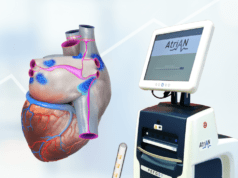
The committee for medicinal products for human use (CHMP) of the European Medicines Agency (EMA) has issued a positive opinion for an update to the European summary of product characteristics of dabigatran (Boehringer Ingelheim) for the treatment of patients with atrial fibrillation (AF).
The CHMP recommends including recent RE-CIRCUIT data, which showed lower rates of major bleeding for uninterrupted dabigatran 150mg twice daily compared to warfarin in AF patients undergoing catheter ablation.
The updated product characteristics, if approved by the European Commission, will state that AF patients undergoing catheter ablation who take dabigatran 150mg twice daily will not need to stop taking their medication.
A press release reports that the results from RE-CIRCUIT showed that uninterrupted dabigatran was associated with a significant reduction in major bleeding event rate compared with INR-adjusted warfarin in the setting of ablation. The data were originally presented earlier this year in a late-breaking session at the American College of Cardiology 66th Annual Scientific Session in Washington and simultaneously published in The New England Journal of Medicine.
In addition, an expert consensus statement on catheter and surgical ablation of AF was published by leading professional organisations including the European Heart Rhythm Association (EHRA) this week in the Heart Rhythm journal. The consensus from ablation experts around the world is that the data and worldwide experience regarding dabigatran now support a recommendation for performing AF ablation with uninterrupted dabigatran with the highest possible evidence level, a Class 1A recommendation.
Jörg Kreuzer, vice president medicine, Therapeutic Area Cardiovascular, Boehringer Ingelheim comments: “The data recommended for inclusion in the dabigatran summary of product characteristics are a great piece of evidence on the benefits dabigatran can offer patients with atrial fibrillation and their treating physicians. We are pleased that both the CHMP as well as international professional bodies recognise the significance of these data in their recommendations to physicians.”









